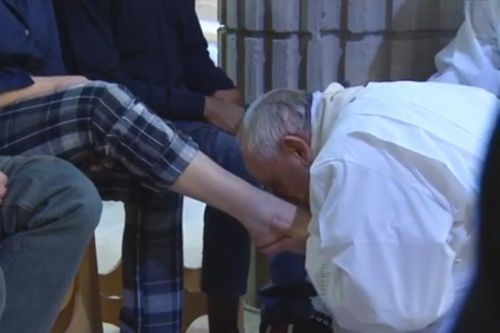For Antonieta Zuniga, a long-time parishioner at Dolores Mission Church in Boyle Heights, her life thus far has dealt her many unexpected blows and heartbreaking twists — in short, she said, “I never thought this would be my life.”
Zuniga’s son has been in prison for 16 years. As a young adult ensnared by drug addiction and criminal activity, he fell victim to California’s “Three Strikes” law, despite committing only non-violent offenses. He was sentenced to 35 years to life.
“We were preparing for different things, for a different life — for our children to grow up, choose a career and go to college,” recalled Zuniga recently. “Today I visit the prison nearly every week, and I always plead with people who have loved ones in prison: Please don’t abandon them … because that’s when they need mercy.
“And please pray for my son, for me, and for all of those in prison,” she said.
Zuniga shared her heartfelt testimony during a special parish gathering at Dolores Mission addressing the inequities of the criminal justice system, which is just one of the important topics being explored as part of a seven-week series of bilingual Friday night community gatherings.
The weekly get-togethers begin with soup, bread and conversation in the outdoor courtyard at 6 p.m., followed by reflection time (focusing on the evening’s central discussion topic) from 6:30 to 8:30 p.m. featuring related statements by Pope Francis, Bible readings, small group discussions and personal stories like Zuniga’s to help bring each lesson to life.
Zuniga praised Dolores Mission for allowing her and fellow parents of incarcerated sons and daughters to share their stories and talk at length about their situations. By contrast, she explained, “there are many churches and places where we can’t talk,” where families like hers are looked down upon or simply ignored.
The Friday night discussion series is based on a six-week study guide created by PICO, a national network of faith-based organizations that work together to address an array of issues in communities across the country. The study guide, which includes Catholic faith reflections, was created to help encourage participants to start a conversation and build relationships with people in their parishes and communities who feel the pain of exclusion; and from there to “go forth,” as Pope Francis urges, to help make a difference locally and beyond.
To encourage greater community participation, Dolores Mission temporarily suspended all other non-essential parish meetings for the duration of the series, which has resulted in growing weekly turnouts. A total of 100 youth, young adults, families, guests and even some homeless individuals (who are receiving support services from the parish’s homeless outreach ministry) participated in the first session on Aug. 28, with several more attending each subsequent week. More than 120 were on hand for the fourth session on Sept. 18 addressing criminal justice.
According to Ellie Hidalgo, pastoral associate at Dolores Mission, it has been “amazing” to witness so many people actively engaged in the weekly dialogues.
“People are really hungry to hear what Pope Francis has to say,” she said.
Maria Guadalupe Nu√±ez, who has been a member of Dolores Mission for 28 years, said she attends the weekly gatherings to broaden her spiritual knowledge, noting that “we never finish learning — there is always something new to gain.”
“Before coming to these gatherings I didn’t know very much about Pope Francis,” Nu√±ez told The Tidings. After participating in the first meeting she realized that learning solely via newspapers or television paled in comparison to “living” the exchange of information with fellow parishioners and guests.

